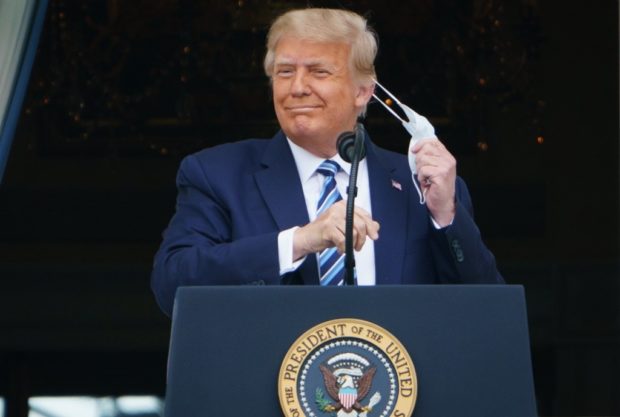‘Mask’ vs ‘muzzle’: Democrats and Republicans don’t speak the same language

U.S. President Donald Trump takes his mask off before speaking from the South Portico of the White House in Washington, DC during a rally. Image: AFP/Mandel Ngan
It’s no news that the American political landscape is polarized. Researchers at Carnegie Mellon University have recently discovered that this polarization also affects the way Americans speak, with Republicans and Democrats using different lexicons to talk about current social issues.
Researchers collected more than 86.8 million comments from 6.5 million users posted beneath 200,000 videos on four channels spanning left- and right-leaning United States news, including MSNBC, CNN, Fox News, and OANN. They then applied modern machine translation procedures to compare the different “news” lexicon that liberals and conservatives use.
While researchers found that a vast majority of words mean the same to Republicans and Democrats, they identified some pairs of words that have very different meanings and usage for people on opposing sides of the political divide.
For instance, the term “mask” among liberal commenters is roughly equivalent to “muzzle” for conservatives. The same phenomenon was observed with the pairs “liberals” and “libtards” as well as “solar” and “fossil.”
Even more extreme, researchers noted that some right-wing news viewers use “BLM” (Black Lives Matter) in the same context as left-wing news viewers use “KKK” (Ku Klux Klan).
“Some of these so-called misaligned pairs seem pretty obvious. But it’s surprising how different some of them are. It gives you a sense of the really tragic polarization that exists today,” commented Mark S. Kamlet, University Professor of Economics and Public Policy and co-author on the study.
Additionally, researchers compared the comments of viewers of CNN, Fox News and MSNBC with more than 4 million comments by viewers of late night comedians Trevor Noah, Seth Meyers, Stephen Colbert, Jimmy Kimmel, and John Oliver. They found words translated from “Fox News English” to “comedian English” were 75% similar, whereas words translated from “CNN English” to “comedian English” were 83% similar.
“We think our method is powerful because it’s efficient. You don’t have to read millions of comments. But if you know that ‘mask’ translates into ‘muzzle,’ you immediately know a debate is going on surrounding freedom of speech and mask use,” Ashiqur KhudaBukhsh, a project scientist in the School of Computer Science’s Language Technologies Institute and co-author on the study, said in a statement.
However, some researchers have pointed out the limits of using machine translation methods to analyze the polarization of American political discourse in recent years.
“What we need is not machine translation. What we need is perspective-taking and explanation—two things that AI algorithms are notoriously bad at,” Morteza Dehghani, an associate professor at the University of Southern California, told Wired. IB
RELATED STORIES:
Borat preys on Giuliani and Trump fans in outrageous sequel
‘Don’t be afraid’ of COVID, ‘get out there,’ Trump says as he returns to White House